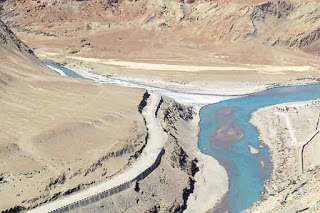Pakistan today claimed the World Bank has “committed” itself to “timely fulfilling its obligations” under the Indus Water Treaty while remaining neutral as Islamabad approached the international lender amid reports that India may revoke the 56-year-old deal. A Pakistani delegation led by the Attorney General for Pakistan, Ashtar Ausaf Ali, met with senior officials of the World Bank at the World Bank Headquarters in Washington, to discuss matters relating to the Indus Waters Treaty that was brokered by the World Bank.
They discussed “the formation of Court of arbitration for resolving the matter of water disputes especially those related to construction of hydropower projects”, Pakistan’s Ministry of Water and Power said in a statement.
“The World Bank will be deciding the issue in the next few days,” it added.
“In the meeting with the Pakistani delegation, the World Bank committed itself to timely fulfilling its obligations under the treaty while remaining neutral,” said a statement issued by the Pakistani Embassy in Washington.
Under the treaty, which was signed by Prime Minister Jawaharlal Nehru and Pakistan President Ayub Khan in September 1960 and brokered by the World Bank, waters of six rivers – Beas, Ravi, Sutlej, Indus, Chenab and Jhelum – were to be shared between the two countries.
Its Article IX deals with arbitration of disputes between the parties concerning the interpretation or application of the treaty or the existence of any fact which, if established, might constitute a breach of the treaty.
The treaty provides specific design criteria for any hydro-electric power plants to be built by India.
On 19 August, Pakistan had formally requested India for settlement of outstanding disputes pertaining to India’s construction of Kishenganga and Ratle hydroelectric plants on rivers Neelum and Chenab respectively, by referring the matters to the Court of Arbitration as provided in Article IX of the Treaty.
Under the treaty, the World Bank has an important role in establishment of the Court of Arbitration by facilitating the process of appointment of three judges, called Umpires, to the Court, while each country appoints two arbitrators.
The Pakistani officials met with senior officials of the World Bank to insist on early appointment of the judges and empanelment the court, it said.
Pakistan’s Ambassador to the US Jalil Abbas Jilani and World Bank’s Executive Director for Pakistan Nasir Khosa also participated in the talks.
The World Bank was represented by Senior Vice President Anne-Marie LeRoy; Vice President for South Asia Annette Dixon; Deputy General Counsel for Operations Alberto Ninio; Chief Counsel for South Asia Melinda Good; and Senior Counsel for International Waterways Victor Mosoti.
Earlier, Prime Minister’s Advisor on Foreign Affairs and Security, Sartaj Aziz said an attempt by India to block Pakistan’s water could be seen as “an act of war.”
Like Us on Facebook!
Prime Minister Narendra Modi met with officials to review provisions of the Indus Water Treaty with Pakistan. In that meeting it was decided that India will “exploit to the maximum” the water of Pakistan-controlled rivers, including Jhelum, as per the water-sharing pact.
The meeting came as India weighed its options to hit back at Pakistan in the aftermath of the Uri terror attack that left 18 soldiers dead, triggering demands that the government scrap the water-sharing deal to mount pressure on the country.
Subscribe Us on YouTube!
source: financial express















